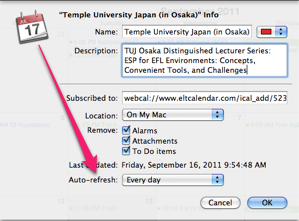ETJ Hiroshima:
Chugoku ELT Expo
Date: Sunday, October 24th, 2010 Time: 9:30 AM - 6:00 PM
Speaker: Many speakers
Description:
Bringing together all English teachers. There will be presentations and materials for college teachers, high school teachers. elementary school teachers, kindergarten teachers. In fact, the aim is to provide top-class presentations and material displays for every kind of English teacher. You can preregister for the Expo at eltnews.com/ETJ/events/preregistration.shtml. It is OK to attend the Expos without preregistering but it saves time on the day of the Expo both for yourself and for the volunteers taking care of registration.
10:00-10:45
PHONICS: Building block for speaking and reading
Ron Klein
After learning basic English vowel sounds (short, long, diphthongs), it is easier to break unknown words into syllables for pronunciation. Phonic syllabication then becomes a useful tool to sound out unknown works encountered in reading. This workshop will give a brief overview of the phonic approach to pronunciation, including mouth-stretching exercises.
Aimed at: Elementary, junior high, high school teachers
Materials promoted: None
Communication topics that matter
Joy Jarman-Walsh
How to design university level communication courses for low to intermediate level students using topics you care about as a teacher and your students should care about. Bring ethics, debate, discussion and a safe environment to raise questions into your classroom. Use newspaper articles and local issues as your curriculum or incorporate them as extensions to textbook activities. Get students using Twitter as discussion homework tool.
Aimed at: University teachers
Materials promoted: None
Voice recorders: a useful tool
George Higginbotham
This workshop will briefly outline the pros and cons of using voice recorders in (and outside of) the language classroom. Participants will have a chance to play with this versatile tool and consider how they might use them in their own teaching situation.
Aimed at: All teachers
Materials promoted: None
The challenges of teaching translation at a Japanese university
John McLean
I currently teach two courses on translation at Yasuda Women's University. In this presentation, I will talk about: the challenges I had to overcome in order to persuade the university to allow me to teach courses traditionally assigned to Japanese academics; the difficulties I had developing materials that meet the students' needs; and the rewards of teaching courses that are both mentally challenging to me and useful to students.
Aimed at: Anyone interested in translation
Materials promoted: None
11:15-12:00
Motivating teenagers and adults to communicate
David Paul
How can we teach university students or adults who are still beginners or high beginners when they try to communicate? How can we teach junior/senior high schools so that they get a good foundation in communicative skills. 'Communicate', a course for Japanese beginners, addresses these needs, and will be published in a completely new edition early next year.
Aimed at: Teachers of teenagers and adults
Materials promoted: Communicate
The goal driven class - We can do it with WE CAN!
Rumiko Kido
When children achieve goals during their English classes, they become more motivated to study and parents and teachers can easily check their progress! But how exactly can a teacher bring goals into the lesson? In this presentation, experience how chants, games and extension materials fit into the goal driven class.
Aimed at: Teachers of children
Materials promoted: We Can
Are these tasks and assignments really improving proficiency test scores?
Yuka Masuda
Masda (2010) examined the effects of various activities in a computer-assisted proficiency test course on the subsequent proficiency score improvements and found that all these learning activities were effective but that listening skills achievement test scores were a particularly reliable indicator of improvements. This study adds data and discusses further.
Aimed at: Higher education
Materials promoted: None
Corpus linguistics and vocabulary Instruction
Kenneth Fordyce, Warren Tang
We will report on research on the differential effects of explicit and implicit vocabulary instruction in a university course structured around reading Harry Potter and the Philosopher's Stone. We will also describe the development of the targeted list of 200 keywords based on corpus analysis of the text.
Aimed at: University teachers
Materials promoted: None
12:30-1:15
What are the ten most effective vocabulary activities?
Paul Nation
This talk presents ten proven and very useful activities for helping learners increase their vocabulary knowledge. In addition, reasons are given why these techniques were chosen to be in the top ten. These reasons relate to the four most important jobs of the vocabulary teacher.
1 Plan and provide a well-balanced course
2 Train the learners in the four most useful vocabulary strategies
3 Test the learners
4 Teach vocabulary
Aimed at: All teachers
Sponsored by Compass Publishing
Identifying and responding to learning weaknesses in the English classroom
Cynthia Akazawa
Find out about learning weaknesses that prevent some students from thriving in a normally effective English curriculum. Learn what you can do to improve your early childhood programs to help prevent these weakness from becoming disabilities and how to more effectively respond to behavioral issues associated with vulnerable students
Aimed at: Teachers of children
Materials promoted: None
Assisting students to arrange study abroad programs
Jim Forsyth
Once students have started studying EFL, they are more likely to become interested in supplementing or extending their study with a short group tour, or a longer individual course abroad. Some Junior Highs, many High Schools, and most universities and colleges have in-house programs. Language school owners are well-positioned to offer programs to students not catered to by their institutes.
Aimed at: Mainly language school owners, but also of interest to those involved in their institutes' study abroad programs.
Sponsored by OPM
2:15-3:00
Choosing and using musical materials in the classroom
Laurie Thain
Laurie will identify and discuss some important characteristics of music and rhythm that enhance learning. She will then suggest what to keep in mind when choosing musical materials and demonstrate a variety of songs and chants that work well for teaching English to young and very young learners.
Aimed at: Teachers of young learners
Materials promoted: Jazz Chants/Let's Chant Let's Sing
Negotiating effectively and politely across cultures
Fuyuko Ruetnik
Comparion of Linguistic Strategies Among International Students in Japan This study aims to explore different styles of polite behaviors demonstrated among international students in Japan. The preliminary findings indicate that both Japanese and Indonesian students preferred less explicit linguistic expressions in order to create a harmonious atmosphere, while Germans students tended to prefer more explicit and direct linguistic approaches.
Materials promoted: None
Personal construct psychology and its implications in the classroom
David Paul
Personal construct psychology involves the notion that reality is always experienced from a personal perspective. Another key aspect is that we choose to do what we anticipate will most likely improve our understanding and our ability to anticipate. David Paul will demonstrate how these and other related insights have deep implications for how to teach effectively.
Aimed at: Teachers or all age groups.
Materials promoted: PCP has had a deep influence on all David Paul's books.
Turnitin - the problem of plagiarism and what you can you do about it
Jason Good
54% of students in the US admit to plagiarizing from the internet. 47% of students believe their teachers sometimes choose to ignore students who are cheating. We'll look at the issue, and also look at Turnitin antiplagiarism service, used by half a million teachers worldwide, and growing fast!
Aimed at: High school / university Promoted: Turnitin antiplagiarism service
3:30-4:15
Developing fluency across the four skills
Paul Nation
About one-quarter of the time in any course at all levels of proficiency should be spent on fluency development. Fluency development activities typically require four conditions, (1) a focus on the message, (2) very easy material, (3) pressure to perform at a faster than usual level, and (4) quantity of practice. In this workshop we will analyse some fluency development activities across the four skills of listening, speaking, reading and writing and then look at a much wider range of fluency activities.
Aimed at: All teachers
Sponsored by Compass Publishing
Do sweat the small stuff
Renae Harada
I recently had a sudden increase in children's classes. These children were brilliant teachers and in a short time they (and my own two little ones) taught me many lessons on "teaching" small children. I'd like to share some of these lessons in this presentation.
Aimed at: Teachers of young children
Materials promoted: None
Teaching very young learners
Cedric Noto
This presentation focuses on teaching English to very young learners (youchien aged children), 3 to 6 years old. I will present a sample lesson structure, general tips on conducting effective games and activities, sample games for different purposes (introducing vocabulary, reviewing vocabulary, consolidating vocabulary, integrating whole language), and typical activity dialog.
Aimed at: Teachers of youchien aged children.
Materials promoted: None
4:45-5:30
A fun, creative, low-tech approach to autobiographical writing
Richard Gabrielli
Using just a sheet of A4 paper, some art materials and a lot of creativity, students can produce a pamphlet with text and illustrations on any aspect(s) of their lives they wish to share with others in the class. Sample pamphlets from my classes will be provided, class procedure will be explained, and then participants will be asked to give it a quick try themselves! Aimed at High school and above.
Materials promoted: None
Red Rocket Readers: Launch into literacy
Jo Ando
With 320 titles in both book and e-book format to choose from, Red Rocket Readers provides young learners with ample opportunity to develop reading skills and multi-cultural awareness.
Aimed at: Teachers of young learners
Materials promoted: Red Rocket Readers
Reflecting on appropriate refusals: Video-based instructional activities to foster intercultural speakers
Carol Rinnert
This presentation demonstrates a series of self-reflective, video-based activities created to raise Japanese learners' awareness of effective English pragmatic strategies. The activities encourage learners to produce and evaluate a wide variety of alternate strategies, some of which could be considered more effective than those used in the original video clips.
Aimed at: University, adult, possibly high school
Materials promoted: None
Using Cuisenaire Rods in language classes
Donald Cherry
The presenter will demonstrate activities using Cuisenaire rods to teach English as a Foreign Language. These are rods of various colors, from 1 to 10 centimeters long. Activities focus on the "basics" of English, but can challenge even advanced learners. Non-native English speakers are especially encouraged to attend and participate.
Aimed at: Teachers of any age or level, with the possible exception of those who teach very small children.
Materials promoted: None
Organization: ETJ Hiroshima (English Teachers in Japan) (ETJ Hiroshima)
Cost: ETJ Members: 500 yen
Non-members: 1,000 yen
Venue: Hiroshima Kogyo Daigaku (Naka-ku campus), 5-7 Nakajima-cho, Naka-ku, Hiroshima City
Location: Hiroshima City, Hiroshima Prefecture, Japan
![]() Add this to iCal
Add this to iCal
![]() (Need help?)
(Need help?)
![]() Add to Outlook
Add to Outlook
![]() (Need help?)
(Need help?)
You can add this event to your iCal calendar.
- Click on the iCal icon. Your iCal software will start.
- Click 'Subscribe':

- Under 'Auto Refresh', select 'Every day' in case the the basic details change:

You can add this event to your Microsoft Outlook calendar.
- Click on the MS Outlook icon.
- See what happens.
- Tell us what happens. I don't have MS Outlook on a Windows computer, so I can't test it.
- If you click on the icon and nothing happens, do this:
- Right-click on the icon and save the file.
- According to Microsoft's support page, in Outlook's File menu, you should click Import and Export.
- Click to select Import an iCalendar or vCalendar file (*.vcs), and then click Next.
- Click to select the vCalendar file you've just saved, and then click Open.
Contact ETJ Hiroshima
Website: elt.jp
Email QR Code:





